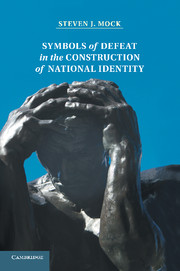Book contents
- Frontmatter
- Contents
- Acknowledgments
- Introduction
- 1 Theories of Nations and Nationalism
- 2 Totem Sacrifice and National Identity
- 3 Symbols of Defeat in National Monument and Ritual
- 4 The Defeat Narrative in National Myth and Symbol
- 5 Implications to Politics and Diplomacy
- 6 Exceptions
- Conclusions
- Bibliography
- Index
6 - Exceptions
Published online by Cambridge University Press: 05 January 2012
- Frontmatter
- Contents
- Acknowledgments
- Introduction
- 1 Theories of Nations and Nationalism
- 2 Totem Sacrifice and National Identity
- 3 Symbols of Defeat in National Monument and Ritual
- 4 The Defeat Narrative in National Myth and Symbol
- 5 Implications to Politics and Diplomacy
- 6 Exceptions
- Conclusions
- Bibliography
- Index
Summary
Although it is hoped that this work has served to demonstrate how common it is for nations to elevate symbols of defeat to the center of their mythologies, as well as suggesting what the ubiquity of this myth can tell us about the construct of the nation in general, we cannot conclude without acknowledging numerous cases that do not fit this pattern. One would be hard pressed, for example, to find a prominent image of defeat in the mythologies of the United States, Russia, or China, and having just named three of the most powerful nation-states in the world, which between them incorporate about a quarter of its population and territory, one can hardly argue that the centrality of the defeat myth is a universal phenomenon. What is universal is the need for any society to commemorate sacrifice, and although the defeat myth may serve as a convenient means for the modern social construct of the nation to manage this function, it is not the only means, and it is a mechanism that will prove more convenient for some varieties of nations in some circumstances than others.
Imperial Nations
Indeed, one might even speculate that it is the very size and power of the United States, Russia, and China that render them exceptional. For if our theory holds that the convenience of symbols of defeat as a means to commemorate sacrifice is the product of the particular relationship between culture and organization posited by Gellner as characteristic of the modern nation, it stands to reason that this will differ among nations that are compelled by circumstance to negotiate this relationship differently. As noted in Chapter 1, Gellner defined nationalism as “a political principle which maintains that similarity of culture is the basic social bond.” But there remains a discrepancy between this and our functional definition of a national discourse, elaborated in Chapter 3 as “the system of myth, symbol, and ritual that serves to channel human violence so as to legitimate and enable social existence in the context of modernity,” as there may be principles other than a perceived common culture capable of organizing such a system of violent authority in the modern context.
- Type
- Chapter
- Information
- Symbols of Defeat in the Construction of National Identity , pp. 260 - 274Publisher: Cambridge University PressPrint publication year: 2011



